Setayesh Radkani
@setayeshradkani.bsky.social
PhD candidate in Brain and Cognitive Sciences @MIT studying legitimacy, punishment and social learning
Also sharing a beautiful illustration of these ideas by my lovely and talented 👩🎨 friend, Adhara Martellini!
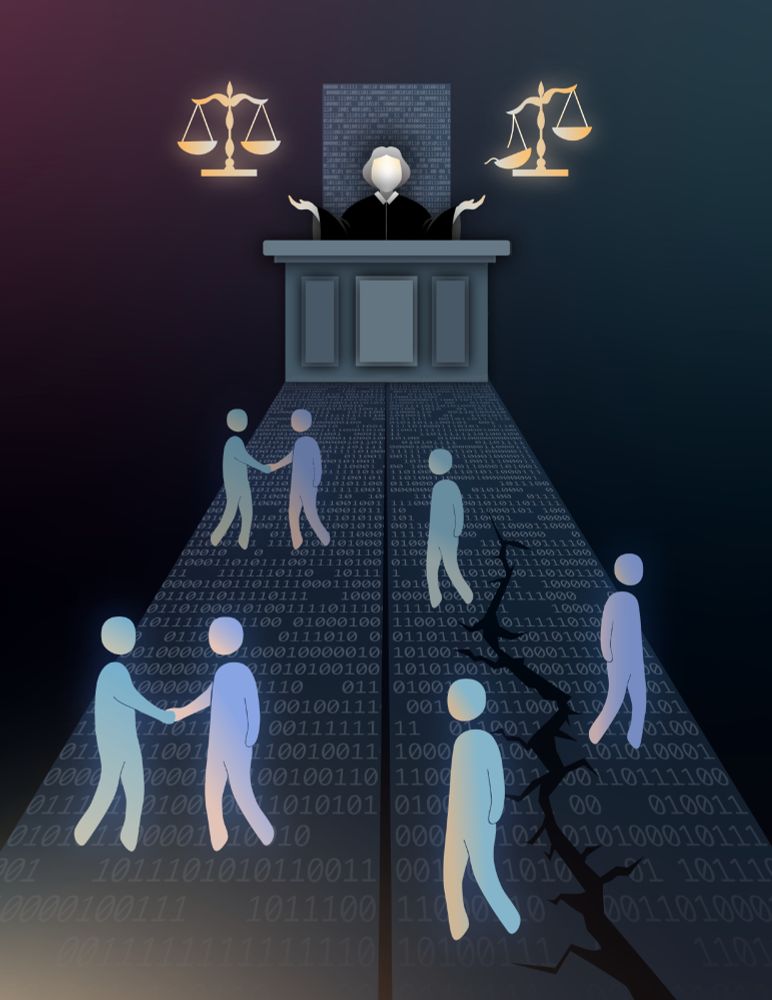
August 8, 2025 at 2:58 PM
Also sharing a beautiful illustration of these ideas by my lovely and talented 👩🎨 friend, Adhara Martellini!
Bottom line: The same punishment can teach different lessons to different people depending on their prior beliefs, even when everyone is reasoning rationally. So, even well-meant punishment can widen divides or fuel polarization.
10/10
10/10
August 8, 2025 at 2:04 PM
Bottom line: The same punishment can teach different lessons to different people depending on their prior beliefs, even when everyone is reasoning rationally. So, even well-meant punishment can widen divides or fuel polarization.
10/10
10/10
Finding 4️⃣: In a separate study, we found that repeated punishments can fail to close societal divides, and may even polarize initially shared beliefs. Our model predicts when punishment works in reducing polarization and when it backfires!
9/N
9/N
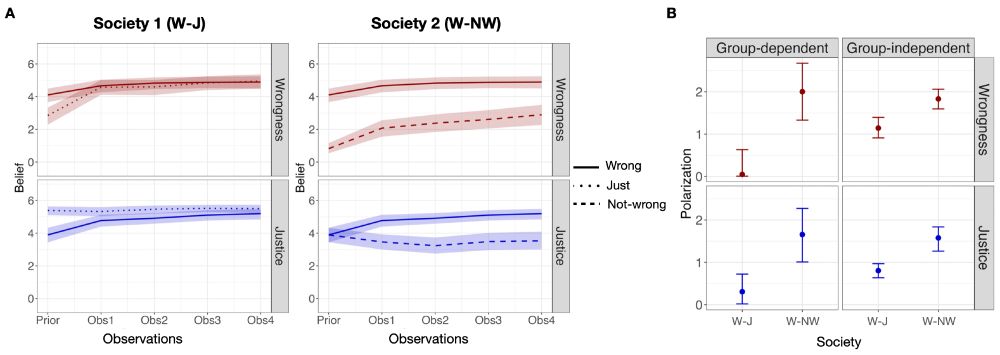
August 8, 2025 at 2:04 PM
Finding 4️⃣: In a separate study, we found that repeated punishments can fail to close societal divides, and may even polarize initially shared beliefs. Our model predicts when punishment works in reducing polarization and when it backfires!
9/N
9/N
Finding 3️⃣: Our computational model simultaneously captures people’s belief updates about the act and the authority, even in novel prior conditions that the model has never seen before 👀; even better than control models that are fit to predict each belief separately!
8/N
8/N
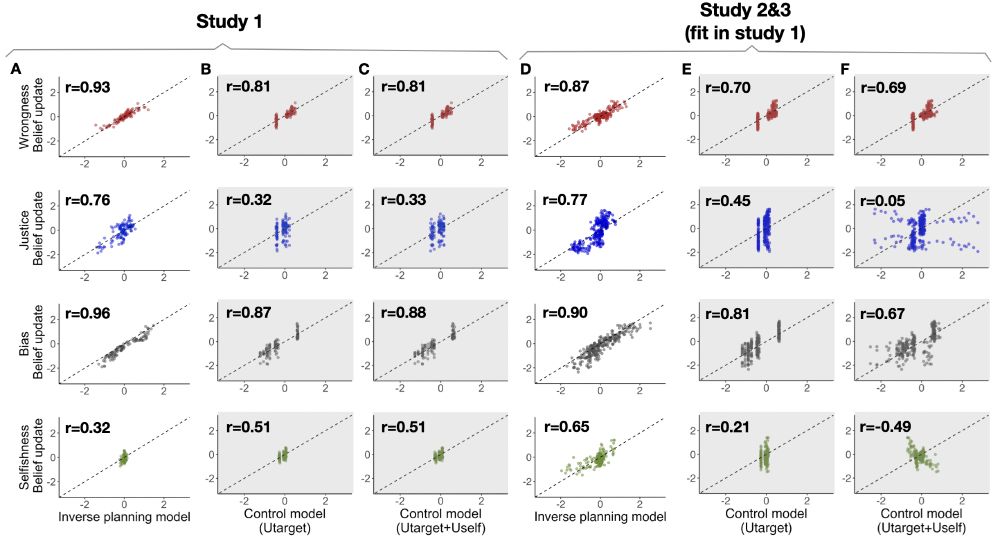
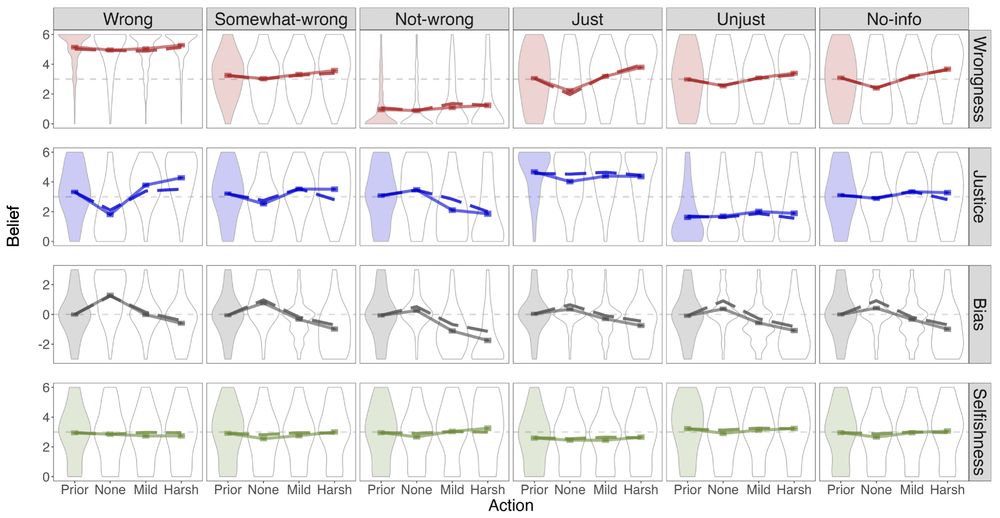
August 8, 2025 at 2:04 PM
Finding 3️⃣: Our computational model simultaneously captures people’s belief updates about the act and the authority, even in novel prior conditions that the model has never seen before 👀; even better than control models that are fit to predict each belief separately!
8/N
8/N
Finding 2️⃣: People’s prior beliefs shape their reasoning about punishment. The same punishment can lead to contrasting inferences, depending on the value and uncertainty of prior beliefs about both the act and the authority.
7/N
7/N
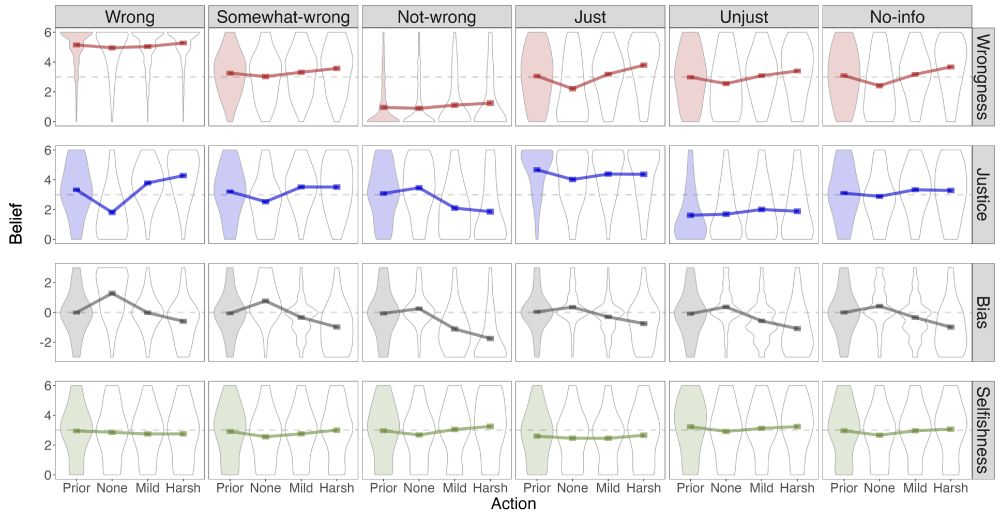
August 8, 2025 at 2:04 PM
Finding 2️⃣: People’s prior beliefs shape their reasoning about punishment. The same punishment can lead to contrasting inferences, depending on the value and uncertainty of prior beliefs about both the act and the authority.
7/N
7/N
Finding 1️⃣: From observing punishment (or no punishment!), people simultaneously update their beliefs about the wrongness of the target act, and about the authority’s motivations and values.
6/N
6/N
August 8, 2025 at 2:04 PM
Finding 1️⃣: From observing punishment (or no punishment!), people simultaneously update their beliefs about the wrongness of the target act, and about the authority’s motivations and values.
6/N
6/N
Across 3 studies, we used imaginary villages to experimentally control people’s pre-existing beliefs about the target act and the authority. We then measured how observing punishment with different severities moves their beliefs.
5/N
5/N
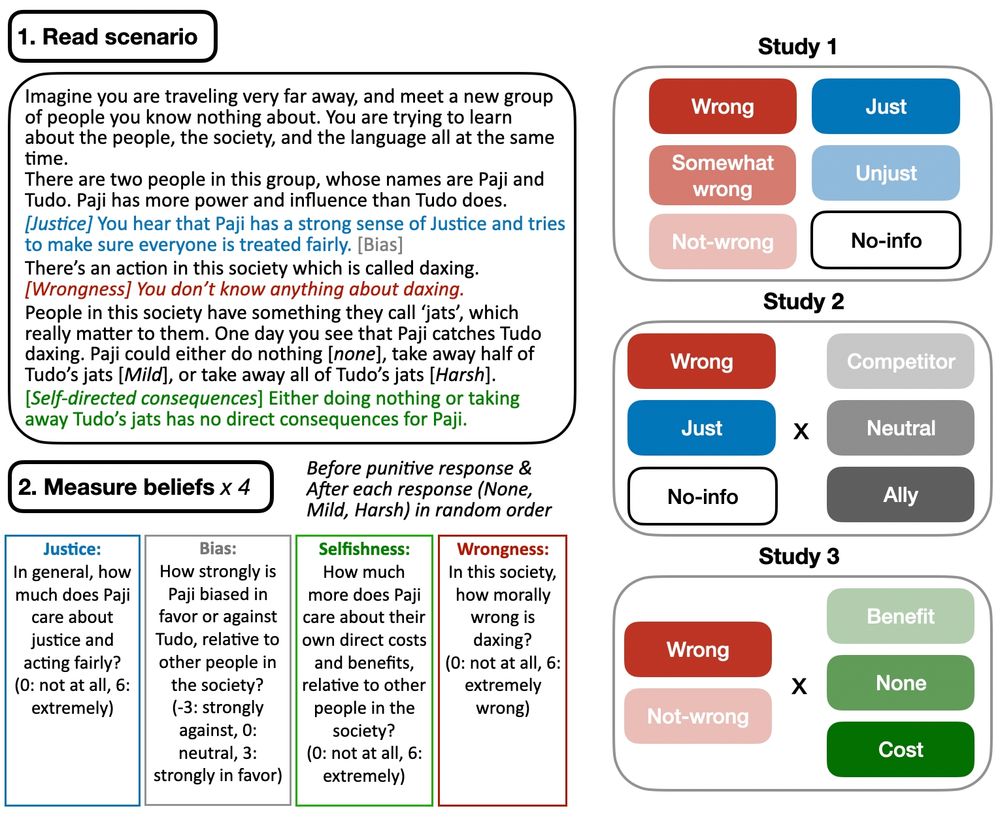
August 8, 2025 at 2:04 PM
Across 3 studies, we used imaginary villages to experimentally control people’s pre-existing beliefs about the target act and the authority. We then measured how observing punishment with different severities moves their beliefs.
5/N
5/N
We used an inverse planning framework: people assume authorities plan punishment to achieve their desires based on their beliefs. By inverting this model, people infer the hidden beliefs and desires that most likely produced the observed punishment.
4/N
4/N
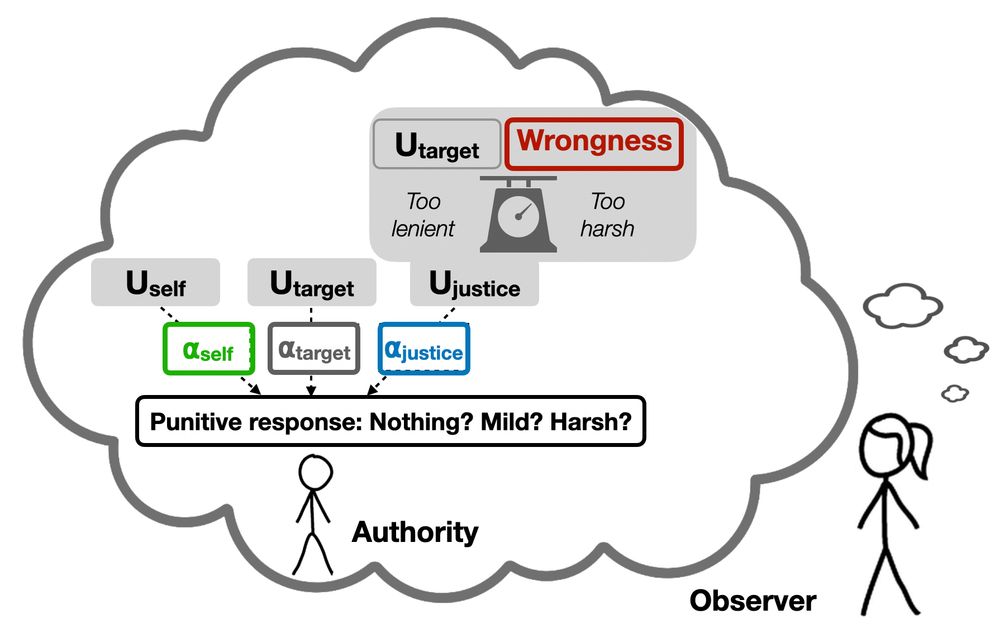
August 8, 2025 at 2:04 PM
We used an inverse planning framework: people assume authorities plan punishment to achieve their desires based on their beliefs. By inverting this model, people infer the hidden beliefs and desires that most likely produced the observed punishment.
4/N
4/N
We solved this puzzle by building a computational model that characterizes “how” people interpret punishment.
Key insight: People use their pre-existing beliefs and opinions to simultaneously evaluate both the norm to be learned and the authority who’s punishing.
But how?!
3/N
Key insight: People use their pre-existing beliefs and opinions to simultaneously evaluate both the norm to be learned and the authority who’s punishing.
But how?!
3/N
August 8, 2025 at 2:04 PM
We solved this puzzle by building a computational model that characterizes “how” people interpret punishment.
Key insight: People use their pre-existing beliefs and opinions to simultaneously evaluate both the norm to be learned and the authority who’s punishing.
But how?!
3/N
Key insight: People use their pre-existing beliefs and opinions to simultaneously evaluate both the norm to be learned and the authority who’s punishing.
But how?!
3/N
This is a puzzle in life and in punishment literature!
Even when nobody disagrees about the facts—everybody knows what action happened, who punished it, and what they did to punish it—different observers of the same punishment could come to drastically different conclusions.
2/N
Even when nobody disagrees about the facts—everybody knows what action happened, who punished it, and what they did to punish it—different observers of the same punishment could come to drastically different conclusions.
2/N
August 8, 2025 at 2:04 PM
This is a puzzle in life and in punishment literature!
Even when nobody disagrees about the facts—everybody knows what action happened, who punished it, and what they did to punish it—different observers of the same punishment could come to drastically different conclusions.
2/N
Even when nobody disagrees about the facts—everybody knows what action happened, who punished it, and what they did to punish it—different observers of the same punishment could come to drastically different conclusions.
2/N
Thanks for this! Could I please be added as well?
November 11, 2024 at 9:09 PM
Thanks for this! Could I please be added as well?
Huge thanks to @dgrand.bsky.social , @falklab.bsky.social and @anthlittle.bsky.social for their feedback on this work, and to our funding sources!
13/13
13/13
October 15, 2024 at 6:35 PM
Huge thanks to @dgrand.bsky.social , @falklab.bsky.social and @anthlittle.bsky.social for their feedback on this work, and to our funding sources!
13/13
13/13
We need these authorities to succeed in being seen as independent and truthful, because in this space of uncertainty, those are the voices that can move people toward an accurate outcome
12/N
12/N
October 15, 2024 at 6:33 PM
We need these authorities to succeed in being seen as independent and truthful, because in this space of uncertainty, those are the voices that can move people toward an accurate outcome
12/N
12/N
Given the current 👋 state of things, this work offers insight into the challenges faced by independent election observers, public health professionals, and others seeking to cultivate credibility as debunkers
11/N
11/N
October 15, 2024 at 6:32 PM
Given the current 👋 state of things, this work offers insight into the challenges faced by independent election observers, public health professionals, and others seeking to cultivate credibility as debunkers
11/N
11/N
Finding 3: Differing beliefs about authorities can spread polarization
When beliefs about the authority diverge in the original domain (election fraud), their debunking can polarize the two groups in a new domain (e.g., public health) even when the groups initially share the same perspective
10/N
When beliefs about the authority diverge in the original domain (election fraud), their debunking can polarize the two groups in a new domain (e.g., public health) even when the groups initially share the same perspective
10/N
October 15, 2024 at 6:30 PM
Finding 3: Differing beliefs about authorities can spread polarization
When beliefs about the authority diverge in the original domain (election fraud), their debunking can polarize the two groups in a new domain (e.g., public health) even when the groups initially share the same perspective
10/N
When beliefs about the authority diverge in the original domain (election fraud), their debunking can polarize the two groups in a new domain (e.g., public health) even when the groups initially share the same perspective
10/N
Finding 2: Credibility isn’t just about unbiasedness
Consistent with other work in political science, authorities seen as biased can still be effective debunkers – if they are seen as biased *in favor* of the perspective they are debunking, although this depends on the uncertainty of beliefs
9/N
Consistent with other work in political science, authorities seen as biased can still be effective debunkers – if they are seen as biased *in favor* of the perspective they are debunking, although this depends on the uncertainty of beliefs
9/N
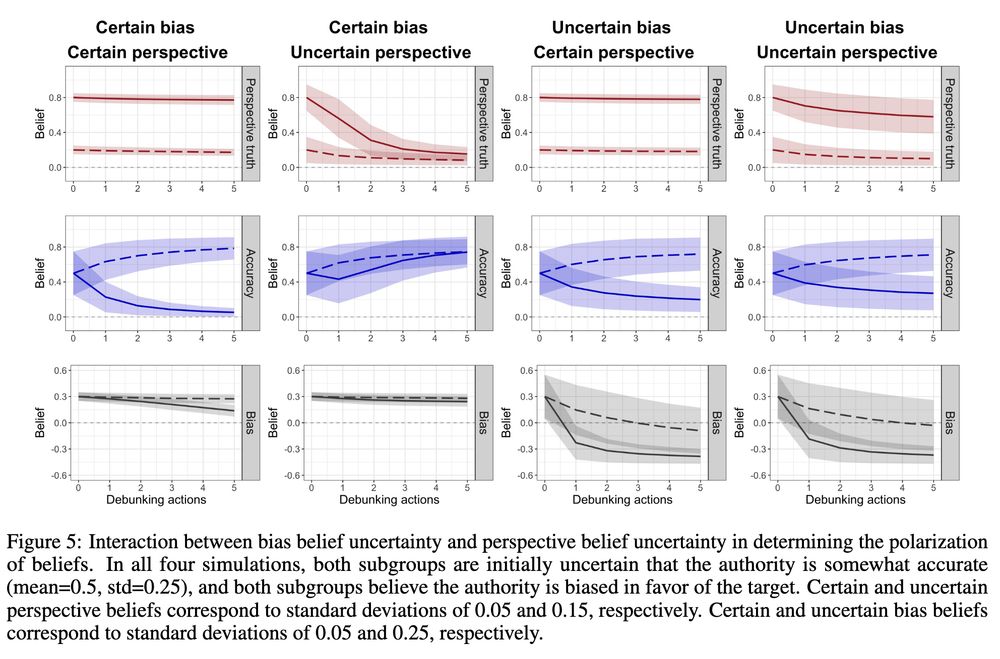
October 15, 2024 at 6:30 PM
Finding 2: Credibility isn’t just about unbiasedness
Consistent with other work in political science, authorities seen as biased can still be effective debunkers – if they are seen as biased *in favor* of the perspective they are debunking, although this depends on the uncertainty of beliefs
9/N
Consistent with other work in political science, authorities seen as biased can still be effective debunkers – if they are seen as biased *in favor* of the perspective they are debunking, although this depends on the uncertainty of beliefs
9/N
if people are certain, debunking – even by a reasonably unbiased, committed authority – fails:
1) The groups' beliefs about the perspective remain polarized
2) The groups' initially shared beliefs about the authority additionally diverge!
8/N
1) The groups' beliefs about the perspective remain polarized
2) The groups' initially shared beliefs about the authority additionally diverge!
8/N
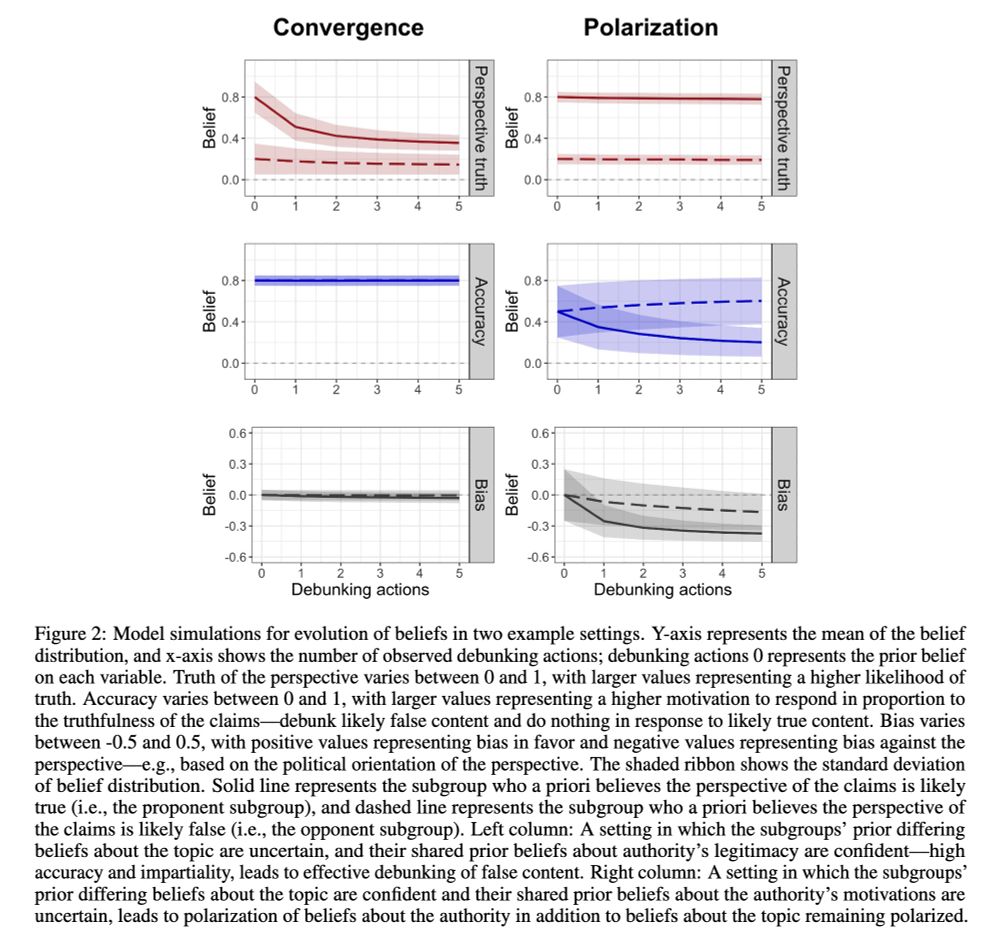
October 15, 2024 at 6:29 PM
if people are certain, debunking – even by a reasonably unbiased, committed authority – fails:
1) The groups' beliefs about the perspective remain polarized
2) The groups' initially shared beliefs about the authority additionally diverge!
8/N
1) The groups' beliefs about the perspective remain polarized
2) The groups' initially shared beliefs about the authority additionally diverge!
8/N
Finding 1: Debunking can work…sometimes
If initial beliefs in the perspective (“the election was unfair”) are held with some uncertainty, then groups can eventually converge on shared beliefs, if they also believe the authority is unbiased and committed to the truth. But …
7/N
If initial beliefs in the perspective (“the election was unfair”) are held with some uncertainty, then groups can eventually converge on shared beliefs, if they also believe the authority is unbiased and committed to the truth. But …
7/N
October 15, 2024 at 6:27 PM
Finding 1: Debunking can work…sometimes
If initial beliefs in the perspective (“the election was unfair”) are held with some uncertainty, then groups can eventually converge on shared beliefs, if they also believe the authority is unbiased and committed to the truth. But …
7/N
If initial beliefs in the perspective (“the election was unfair”) are held with some uncertainty, then groups can eventually converge on shared beliefs, if they also believe the authority is unbiased and committed to the truth. But …
7/N

